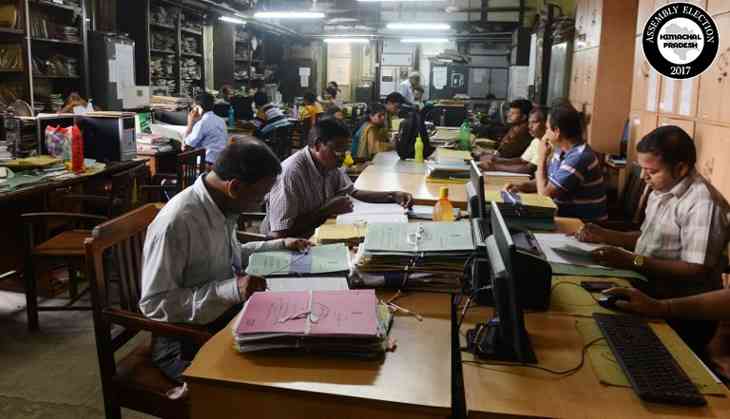Himachal Polls: Will employees be the deciding factor in the state again?

The most important factor in determining the outcome of the Assembly polls in Himachal Pradesh has always been the government employees. This time too it is this factor which will have a significant impact on which party forms the government.
While privatisation and its mode of employment has been expanding in the state, it is still the tag of a 'Sarkari Babu' that is the most coveted. Go to any corner of the state, even the top shots in the private-sector organisation would be willing to quit at the drop of a hat if they get an opening in the government sector.
It does not matter if their take-home salaries come down or their fancy designations do not remain with them and even if they are posted to remote areas. This has always been the mind set.
Hence it is those employed with the government, whether regular, contractual, outsourced or through any other mode, who will be the deciding factor since they form the single largest chunk of voters. Add to them the pensioners, and they become the deciding factors.
According to reports, there are 2.72 lakh people employed in the government sector while there are over 1.52 lakh pensioners in the state. Together they have the capacity to influence more than 10 lakh of the total, around 49 lakh, voters in the state.
Though the successive governments in the state of both the Congress and the Bharatiya Janata Party (BJP) have always claimed to be well-wishers of the employees and have always showered sops on them, the latter have always complained of being underpaid, over-worked and neglected. Hence they have never gone along with only one of these parties.
The administration in Himachal has generally followed the neighbouring state of Punjab that is also seen as the big brother in the region in terms of salary pattern and the benefits that come along.
This time around also, the Virbhadra Singh-led Congress government showered employees with sops as the elections approached. The biggest one was reducing the tenure of contractual employees from five years to three years for regularisation of their jobs. The Congress went a step ahead by promising to reduce it further by another year if elected to power in its manifesto.
This has given jitters to the BJP which did not even come out with a manifesto for these polls and chose to bring out a 'Vision Document' instead. BJP detractors have been raising a question mark on this pointing out that bringing out just a Vision Document shows lack of commitment.
However, the employees remain miffed over the failure of the Congress government to fulfill its other promises like parity in pay scales etc. The pensioners are annoyed over certain delays in getting the pension benefits. Then there are the regular complaints of political interference in postings and transfers.
While the Congress claims to have done the most for the employees during this tenure, the BJP leaders have been saying that the tenure saw the highest number of litigations in the administrative tribunal. The various categories of employees continue to voice the concerns that they want the government to address.
CPM leader ND Ranaut lists regularisation and the concerns of outsourced employees on top of the concern-list.
The BJP tenures in the state has seen some of the biggest employee agitations. The most intense agitation had come in 1990 when Shanta Kumar was chief minister. It was over the implementation of 'No work, no pay' principle.
The second one had come during Prem Kumar Dhumal's tenure in the late nineties over attempts to divide the Himachal Pradesh State Electricity Board into smaller entities.
Employment has been one of the core issues during the campaign to these polls. People in Himachal Pradesh are not happy with the private sector jobs that are in the offing after 25 years of neo-liberalisation.
Majority of those working in the factories that have come up in the industrial belts in the foothills along with those in the tertiary sector feel under-employed and exploited. They have been complaining of getting pittance in wages that makes it difficult to make ends meet.
With a high level of education, the youngsters of the state can be found working in all parts of the country. A vast majority of them is always looking towards coming home and contribute to their home state if they get proper jobs, preferably a government one.
Edited by Jhinuk Sen
First published: 8 November 2017, 17:23 IST

